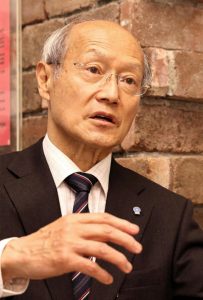Views on Ukraine invasion from A-bombed Hiroshima’s perspective: Makoto Otsuka, 73, director general of Holocaust Education Center
Apr. 9, 2022
Learn from history and raise your voice
Hospitals destroyed by artillery fire, kindergartens bombarded, and many civilians, including children, brutally massacred. What is the purpose of such destruction? Why has all this been necessary? Humans have not learned anything from the horrors of the Holocaust or the history of war. I feel as if the tragedies are being repeated.
While traveling 51 years ago, I met Otto Frank, the father of Anne Frank, author of Anne Frank: The Diary of a Young Girl. He implored me to be someone who actually does something to create a peaceful world, not just sympathize with victims. I visited many countries to collect the belongings and documents of Holocaust victims and established a center in Fukuyama City as an education facility to teach about the history of the Holocaust.
Starting at the time of preparations for opening the center, I visited Jewish people who had experienced the Holocaust as well as museums in many countries. Ukraine has remains of ghettos into which Jews were segregated during World War II. I also met people born in Ukraine who had experienced the Holocaust.
The Jewish people I met placed great value on remembering, not hating, the acts committed by the Nazis. I still remember the calls they made to Japan to learn about the Holocaust because of the reality of that situation is not well understood.
However, Russia’s invasion of Ukraine caused tremendous damage to Kharkiv, Ukraine’s second largest city in the country’s east, and with that a 96-year-old survivor and living witness to the Holocaust was killed in an indiscriminate attack. A monument that conveys the damage caused by Nazi Germany was also destroyed. Russia’s attack has erased and destroyed the past of people who are making an effort to memorialize the pain and suffering associated with the Holocaust. Russia’s aggression is more shocking than the world realizes.
In Ukraine now, the corpses of innumerable civilians are being discovered. President Volodymyr Zelenskyy has denounced Russia’s attack as genocide, and similar criticism has arisen around the world. I do not have any doubt that genocide is taking place. However, it is still too early to compare this situation with the genocide that took place in Rwanda, for example. There is a need to hasten on-site investigations and verification by the United Nations and other organizations.
A tendency has become apparent to liken the recent invasion to Nazi Germany and the Holocaust during World War II. Politicians use such terms to make comprehension of the invasion easier. However, it is far better to learn about history and understand each case independently as historical fact.
I believe the only way to put an end to the cycle of violence and war is education. Since the opening of the Holocaust Education Center, I have committed myself to peace education for 27 years. Despite that, I feel a sense of hopelessness because I cannot put a halt to the current crisis. Many people around the world likely feel the same way.
War drives humans to madness. Russia’s recent invasion is not simply a problem between Russia and Ukraine but a problem shared by all of humanity. From varied perspectives, each and every one of us needs to learn about the history of the Holocaust, genocides of the past, and the atomic bombings.
Anne Frank wrote in her diary that human beings have an instinct for death and destruction. On the other hand, however, she believed that human nature is intrinsically good. Her words are still trying to resonate with all of us.
In Otto Frank’s own words, I would like everyone to not only sympathize with the tragedy that is happening in Ukraine but also to act for the sake of peace. If children of the A-bombed city of Hiroshima in particular can raise their pure voices in unison, the world will surely listen. (Interviewed by Mio Hara)
(Originally published on April 9, 2022)








